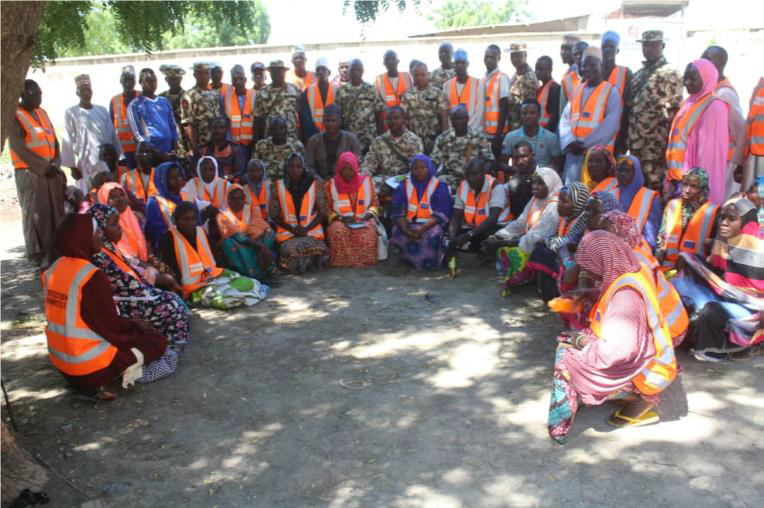
On the occasion of the Human Rights Day celebrated every year on 10 December — the day the United Nations General Assembly adopted the Universal Declaration of Human Rights, in 1948, the Service for Foreign Policy Instruments contributes to EU’s strong commitment to promoting and protecting human rights in the world. This year’s theme related to the COVID-19 pandemic – ‘Recover Better: Stand Up for Human Rights’ – reflects the EU’s support towards a sustainable recovery at global level.
The EU’s founding values are ‘human dignity, freedom, democracy, equality, the rule of law and respect for human rights’ (Article 2 of the Treaty on European Union). These principles are at heart of the Union’s external action: be it in the programmes and projects it funds in different parts of the world or in the cooperation with partner countries, international organisations and other stakeholders.
The EU Action Plan on Human Rights and Democracy 2020-2024, adopted earlier this year, provides a comprehensive framework for defending human rights and democracy all over the world by using the EU’s resources in a fast and effective way.
The EU’s Service for Foreign Policy Instruments is contributing with concrete results in this area through a series of on-going initiatives.
Promoting human rights in EU crisis-response and peace-building actions
Protection and promotion of human rights forms a central part in the EU’s crisis response and peace-building actions. A specific focus is on the protection of civilians affected by conflict.
- For example, in Ukraine, the EU has supported the development, adoption and implementation of the National Protection of Civilians Strategy and is now advocating for the introduction of a training course on the protection of civilians in the military education system.
- Through its partnership with the Centre for Civilians in Conflict (CIVIC), the EU has engaged with the authorities in Nigeria to improve the protection of civilians in connection with security operations through the promotion of measures aimed at reducing the risk of civilian harm. These include:
- Specific modules on ‘Protection of Civilians’ and ‘Civilian Harm Mitigation’ in the curricula of the key military training institutions;
- Several EU supported self-protection workshops for local communities. These empower local communities to develop self-protection strategies and to create platforms for dialogue between security forces and conflict-affected communities. As a result, improved and better coordinated security arrangements and patrols by the military have been put in place.
Human rights and justice
Protection of human rights also include the issue of justice and accountability.
- One of the new EU actions is its support to the United Nations Investigative Team to Promote Accountability for Crimes Committed by Da'esh/ISIL (UNITAD) in its efforts to strengthen Iraqi capacity to exploit the existing documentary evidence-base. This is done with the aim to increase the number of successful prosecutions of Da’esh members in proceedings in Iraq as well as in other countries, for crimes against humanity, war crimes and genocide.
- Other examples include EU support to the truth and justice mechanisms set-up under the Colombia Peace Agreement and support to local victims’ organisations as well as support for the International, Impartial and Independent Mechanism to assist in the investigation and prosecution of persons responsible for the most serious crimes under International Law committed in Syria.
Human Rights during COVID-19 and tailored policy support measures
The Human Rights Policy Support project contributes to the effective implementation of international human rights instruments, principles and standards. It does so primarily by supporting exchange of best practices between the EU and partner countries’ experts, business representatives, academia and stakeholders and by ensuring appropriate follow-up to political and human rights dialogues with governments. Examples of its key specific contributions are:
- promoting and defending human rights of indigenous people by helping to identify the threats and challenges they face in their communities and proposing viable solutions;
- promoting LGBTI rights in Asia through a platform to discuss the principles of equality and non-discrimination for LGBTI through a multi-stakeholder event and learn from concrete success stories from Taiwan, Asia and the EU.
The COVID-19 pandemic has brought new challenges and has exacerbated the need for promoting and defending human rights, especially when it comes to people’s ability to provide for their livelihoods.
The project ‘Business and Human Rights in Asia’, implemented by UNDP, contributes to strengthening human rights and protecting workers in business operations and supply chains. The Human Rights Due Diligence Rapid self-assessment tool, a concrete result of this project, helps companies to assess and manage the human rights impact of their operations during and after the COVID-19 crisis. This tool is available in 10 languages and has had a wide uptake by multinational companies and business associations operating in the region. The tool lists several actions that are based on the UN Human Rights Treaties, the International Labour Organisation Fundamental Conventions, and the UN Guiding Principles on Business and Human Rights. Additional measures include:
- In Indonesia, support to multi-stakeholder consultations on the draft National Business and Human Rights Strategy;
- In Thailand, help with the implementation of the National Action Plan on Business and Human Rights through tailor-made trainings at regional level.
The fight against torture and capital punishment
Human dignity and the right to life are indivisible and universal values at the heart of the European Union. Another important stream of EU’s work in defending human rights is its regulatory work in fighting against the death penalty. The EU ‘Anti-Torture Regulation’ is one of the key tools at global level in banning trade in goods that can be used for the death penalty, and controlling trade in goods that can be used for torture or ill treatment. Equally, the EU is part of the ‘Alliance for Torture-Free Trade’ working together with like-minded partners in ending the trade in goods used to carry out the death penalty and torture.
For more information:
Details
- Publication date
- 10 December 2020
- Author
- Service for Foreign Policy Instruments
